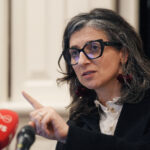presidential visit
In D.C., Herzog highlights Arab-Israeli normalization, Iranian drones in Ukraine
The Israeli president met with Jewish leaders, the secretary of state and House leadership, and participated in an Abraham Accords forum

Drew Angerer/Getty Images
Israeli President Isaac Herzog and Speaker of the House Nancy Pelosi speak with each other as they arrive to deliver remarks to the press before their meeting at the U.S. Capitol October 25, 2022, in Washington, D.C.
Israeli President Isaac Herzog focused on Arab-Israeli normalization and the Iranian drone threat to Ukraine on the first day of a two-day visit to Washington, D.C, his first since being elected as Israel’s president.
Herzog met on Tuesday with...











































